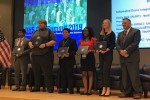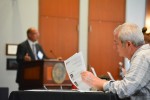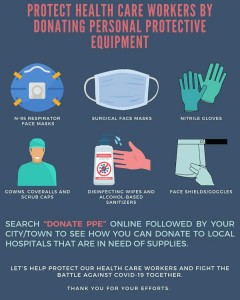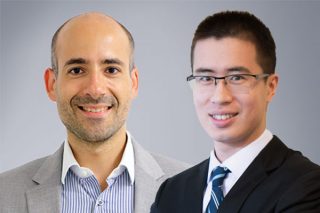News & Events
ALERT Newsletter
ALERT Researchers Matteo Rinaldi and Zhenyun Qian are awarded a $550K NSF Grant and patent June 30, 2020

ALERT Researchers Professor Matteo Rinaldi and Research Assistant Professor Zhenyun Qian were awarded a $550K NSF grant for “Zero Power Wireless Flame Detector for Ubiquitous Fire Monitoring” In May 2020. This award was made through NSF’s technology translation program, Partnerships for Innovation. The goal of the award is to develop a novel micromechanical flame detector which will consume near-zero power while in standby mode until triggered by the specific infrared (IR) signature emitted by a flame. Drs. Rinaldi and Qian will be working with United Technologies Corporation to develop a prototype meeting the demanding national flame detector standards that include a high level of system robustness and stability with respect to environmental variabilities such as extreme temperature and vibration. This planned wireless flame detector is intended to operate under conditions where conventional detectors are limited due to harsh environmental conditions and the zero-power consumption aspect will reduce the cost associated with standard sensor hardware.
Drs. Rinaldi and Qian were also awarded a patent for “Zero power plasmonic microelectromechanical device” in May 2020 related to their technology development for their ALERT Project R2-B.3. This research involves the development of ultra-miniaturized, low-cost, wireless IR sensors which are capable of continuously monitoring for thermal radiation associated with a threat (such as human intrusion) while consuming no power in standby mode.
Dr. Rinaldi’s research with ALERT focuses on the development of a new technology platform capable of performing multiple chemical analyses including gravimetric analysis, IR spectroscopy, and thermal analysis in a miniaturized footprint. The demonstrated technology overcomes fundamental scientific and engineering development challenges, enabling the implementation of a new generation of trace detectors that provide near real-time detection, high sensitivity, and high specificity for a targeted group of explosives, and resulting in very low false positive and false negative rates. Furthermore, the novel zero-power sensing microsystems developed in his ALERT project can enable unattended human detection for border protection by eliminating sensor maintenance cost associated with conventional detectors. Read more about Matteo Rinaldi’s work in Multi-Functional Nano-Electro-Opto-Mechanical (NEOM) Sensing Platform.
Researcher Highlight: Henry Medeiros on CLASP June 29, 2020

For users without YouTube access: Henry Medeiros on CLASP
The Correlating Luggage and Specific Passengers (CLASP) Task Order is a research initiative to develop technology to automatically track passengers and their divested items at the checkpoint using video analytics. This task order, funded by DHS Science and Technology has brought together research teams from several universities including Boston University, Northeastern University, Rensselaer Polytechnic Institute, and Marquette University.
Henry Medeiros, Assistant Professor of Electrical and Computer Engineering at Marquette University, is working on CLASP research that is specifically focused on creating algorithms that track passengers and their baggage items throughout the entire checkpoint. To develop this technology, Henry’s research team uses machine learning and algorithms developed to identify and detect various scenarios that may occur at a checkpoint.
The ultimate goal of Henry’s research team is to simplify the check-in process with a system that would be able to determine that each passenger is following the required security procedures at airport checkpoints. In our latest ALERT video, Henry discusses his work with CLASP and how this research is changing the airport security landscape.
Staff Spotlight: Deanna Beirne April 30, 2020

At ALERT, the work of our faculty, staff, and students is the epicenter of the continuous development of the characterization, detection, mitigation, and response to explosive related threats around the world. In this month’s newsletter, we interviewed ALERT staff member Deanna Beirne, our Senior Director of Research Computing and Technical Program Development to learn more about her work with ALERT.
Deanna, who has worked with ALERT since its inception in 2008, supports the center’s research mission in two key areas. First, her work assures that the multi-university center has a sufficient and robust information technology infrastructure for the work being performed. Secondly, and more recently, Deanna has been providing program management, testbed, and transition support to several of ALERT’s research projects, transition efforts and task orders.
Two of the major research initiatives that Deanna works on are the Correlating Luggage and Specific Passengers (CLASP) and Maturation and Validation of Dielectric Characterization Algorithms DHS Task Orders. CLASP uses advanced video analytics to evaluate data from CCTV security cameras in an effort to develop algorithmic software capable of automatically tracking passengers at airport security checkpoints and associating them with their luggage and items. This automated tracking will be useful to identify certain events within the checkpoint, like theft, or passengers forgetting items at the security checkpoint, while also logging how fast it takes passengers to go through the checkpoint. The Maturation and Validation of Dielectric Characterization Algorithms Task Order involves the development of an advanced passenger screening system used to differentiate between a detected item that could be a threat, like a body-borne explosive, or something benign – like a forgotten wallet. This system could increase security effectiveness and improve the passenger experience by reducing the number of pat-downs needed to resolve body scanner alarms.
Learn more about Deanna’s work with CLASP and Maturation and Validation of Dielectric Characterization Algorithms in the interview below.
As the Program Manager for CLASP, can you describe recent research developments and how this will impact next steps in the project?
Yes, a few months ago the researchers were able to benchmark their algorithms on a new video dataset collected at our Video Analytics Lab at the Kostas Research Institute. Built specifically for this project, the lab is configured with a CCTV camera grid, networked video recording system and a mock airport security checkpoint. The lab configuration leverages actual security checkpoint equipment donated to us by the TSA, Rapiscan and Smiths Detection.
To generate the video data we need for the project, we have volunteers act out scenarios which may occur in real life at an airport security checkpoint, and have the video cameras record them. At out last video data collection event, we had Transportation Security Officers, and even a service dog participate, adding another layer of realism to the video data the researchers have access to.
The performance results of the algorithms developed by the teams at Marquette University, Northeastern University, and Rensselaer Polytechnic Institute were good enough to begin merging the individual software components together, which is the next step in creating a real-time system.
What ongoing challenges have there been with CLASP research?
First, every airport is uniquely configured with completely different layouts and physical constraints. This makes it difficult to find a solution that will work for all checkpoints. Given these limitations, it has been extremely beneficial to speak directly with security stakeholders and visit various airports to get input on a solution that can work across a variety of configurations, while leveraging existing airport infrastructure and remaining cost-effective.
Second, getting video data that can be used to test and improve the algorithms has been a challenge as well. Humans are incredibly good at looking at imagery and interpreting what is present or happening in a photo or video; computer algorithms are getting better, but it takes a lot of work to get them to do what people can do. The algorithms need to be trained to correctly interpret the actions and objects you want the algorithm to understand. This, as anyone can imagine, requires a lot of data that we collect in both lab and live environments. The lab is used to generate specific scenarios that may not occur frequently at live checkpoints. We then need to test and train those same algorithms on video data collected at actual airport checkpoints. Using actual footage from real checkpoints will assure CLASP will be effective in a live airport deployment.
You also provide program management for ALERT’s DHS task order focused on the maturation of dielectric characterization algorithms and a partnership with Astrophysics, Inc. to develop 3D reconstruction algorithms. Can you explain what those projects are and their expected deliverables?
The Dielectric Characterization project is funded by the DHS S&T Screening at Speed program and is led by Prof. Carey Rappaport, ALERT’s Deputy Director. The work focuses on taking data collected by a next-generation Advanced Imaging Technology (AIT) screening system, one similar to what you pass through in the airport security checkpoint, and determining if a detected item is something that might be a threat, like a body-borne explosive, or not, like a forgotten wallet. In order to do this, the team is developing software to evaluate the response of the millimeter waves transmitted by the system when they come into contact with an object on the body. From this response, the software can derive the dielectric constant of the object and determine if it is a potential threat, requiring a pat-down, or not.
ALERT was approached by Astrophysics, Inc. when it began developing its Multi-View Computed Tomography Cargo System. Astrophysics created a scanning system that was groundbreaking in its sensor array and scanning methods, but they were in need of a method to convert the 2D computed tomography (CT) X-ray images of shipping pallets that the system generated into clear 3D reconstructions of the pallets. ALERT had realized prior success in the CT reconstruction domain from the DHS funded CT-EDS Reconstruction Initiative and leveraged ALERT researchers such as Prof. David Castanon(BU), Prof. W. Clem Karl(BU), Prof. David Kaeli(NU), and Fernando Quivera PhD, to work on this new problem presented by Astrophysics, Inc. The work has proven very successful and the developed system is currently deployed at JFK airport.
How do all three of the projects that you describe change the screening process in their respective arenas?
The Dielectric Characterization project will help to enhance the detection capabilities of scanning systems, thereby minimizing the number of pat-downs or secondary inspections that have to be done on passengers. By minimizing the number of pat-downs at a checkpoint, it improves the passenger experience and makes the checkpoint line move faster. The 3D image reconstruction developed for the Astrophysics MVTC system makes imaging of cargo clearer and faster – it helps automate a process which is very manual right now. The CLASP program will help to bring in-line, risk-based screening to the airport security checkpoint. Our goal in all of these projects is to make security screening faster, smarter, and less intrusive – both for passengers and DHS components, like TSA and CBP, who rely on them.
When asked what is the most interesting part of her role, “being a part of research projects that are working on ground-breaking methods for advancing security technologies,” is a highlight for her. As a program manager, her work ensures that ALERT research is transferred into real-world solutions.
“The problems we work on as a center are complex and continue to evolve. Figuring out solutions for those problems, such as – are we able to tell if an object on a person is a threat without a pat-down; can we develop 3D image reconstructions that are detailed enough that a pallet of cargo doesn’t have to be unpacked to be inspected; can we leverage video technologies to make the airport security line faster and more efficient – are challenging, and that makes them exciting to work on” she said.
In addition, to her work with ALERT, Deanna volunteers for Boston-area art organizations like the Boston Center for the Arts and enjoys hiking with her border collie.
Meet the ALERT Students April 30, 2020
For users without YouTube access: Meet the ALERT Students
Watch our latest video, Meet the ALERT Students! Hear from Annette Colón Mercado (Project R3-C), Muhammad Usman Ghani (Project R4-C1), and Meng Zheng (Project R4-A3) as they discuss their projects and the importance of ALERT research while participating in the ALERT Industrial Advisory Board Meeting last fall.
The annual Industrial Advisory Board (IAB) Meeting provides students with opportunities to present their work during the student poster session, which allows for networking with industrial members as well as local, state, and federal government representatives. Annette has participated in the IAB meeting for two years and she believes that ALERT research is important to her because, “We are working to make our nation a safer and a more secure place by doing the research we do and by implementing these detection systems for DHS current problems.”
ALERT students are engaged in many events designed to highlight their research accomplishments including the Annual Student Pipeline Industry Roundtable Event (ASPIRE) and the ALERT Technology Showcase.
ASPIRE is held annually each spring at Northeastern University in Boston to support students looking for internships, co-op opportunities and full-time jobs. Students have the opportunity to connect with industrial and government partners through one-on-one meetings to discuss their research, practice “elevator pitches” and discuss employment opportunities
ALERT’s Technology Showcase focuses on the transition of ALERT’s work through presentations, posters, and technology demonstrations of the Center’s research and tools. Students from each project are invited to present their project during the poster session which allows them to connect with faculty, industrial partners, and government representatives throughout the Showcase.
For more information on ALERT projects, please visit the following link: https://alert.northeastern.edu/research/
ALERT Event Updates Due to COVID-19 April 30, 2020
The safety of our students, staff, partners and overall attendees is always our top priority. In accordance with social distancing guidelines and stay at home guidelines from the City of Boston, we decided to postpone our ALERT events originally scheduled for this May and July.
The ALERT Technology Showcase, originally scheduled for May 5, 2020, will now be held on Tuesday, November 17 and ADSA22, originally scheduled for May 5 and 7, 2020, will now be held on Wednesday-Thursday, November 18-19. Both will continue to take place at Northeastern University in Boston, MA.
In addition, our Customs and Border Protection Advanced Developments Encompassing Processes and Technologies workshop (CBP-ADEPT-03), originally scheduled to be held on July 8-9 at Northeastern University in Boston, MA, has now been postponed until Fall 2020. We are still working through logistics and will provide the rescheduled date and additional details once they’re finalized.
We ask for your patience as we navigate these unprecedented times since dates and/or schedules could potentially change in the future. We are continuing to monitor this ongoing pandemic, following the guidance of Northeastern University and the City of Boston.
If you have any questions or concerns regarding upcoming events, schedule, or date changes please contact Tiffany Lam at [email protected] or 617-373-2976.
ALERT Industry Partners Respond to COVID-19 Supply Needs April 30, 2020
Image source: DonatePPE.org Infographic
As everyone is aware, the challenges presented by the Coronavirus pandemic have stressed the nation like never before. Each day we hear of the many manufacturing companies who are stepping up in support of the fight against COVID-19. With this in mind, ALERT wanted to highlight a few of our industrial members addressing the critical supply needs of frontline workers and hospital systems throughout the nation and beyond.
Ventilators and other Medical Equipment
- Rapiscan is using several 3D lithography systems to make ventilator parts.
- Smiths Group has delayed the sale of its medical segment in England to make 10,000 ventilators for hospitals and increased production to 24/7. In addition, Smiths Detection in California will temporarily transfer its manufacturing over to medical equipment. Read more about this initiative here.
Personal Protection Equipment (PPE)
- Pendar has put their masks and gowns on a Materials list for donations.
- Astrophysics is donating masks and other PPE to local hospitals within the greater Los Angeles County and other local businesses that don’t have access to masks. Read more about their COVID-19 response here.
The ALERT team is very proud of all our partner companies supporting the fight against the COVID-19 pandemic. For more information on donating or making PPE, visit https://www.donateppe.org/ or https://getusppe.org/give/.
ALERT Students Present Research during Virtual RISE: 2020 April 30, 2020

On April 9th, Northeastern University held the 10th annual Research, Innovation and Scholarship Expo (RISE) 2020 via virtual conference. The expo, traditionally held in person, provides an opportunity for students and faculty members to showcase scholarly research and fundamental discoveries that can be translated into real-world applications. This year, three ALERT students, presented projects to RISE judges and the general public.
Current ALERT students, Mahshid Asri and Elizabeth Wig, presented research work related to a task order contract known as Maturation and Validation of Dielectric Characterization Algorithms. Mahshid and Elizabeth’s presentations focused on reducing pat-down rates at airport checkpoints by using automatic algorithms that can distinguish potentially hazardous foreign objects from the benign ones on the human body, like belts or wallets. Both student presentations were very well received by attendees. Past ALERT Science and Engineering Workforce Development Program (SEWDP) student, Joseph Robinson’s research presentation focused on addressing issues with facial recognition and face tracking within image and video data. He presented research proposing “an adversarial training framework that leverages unlabeled data to improve model performance.”
Presentation posters can be viewed online by clicking one of the links below.
- Mahshid Asri – Automatic Characterization of Body-Borne Threats Using Wideband Radar
- Elizabeth Wig – Wideband Analysis of Imaging of Dielectric-Covered Curved Surfaces for Millimeter-Wave Security Scanning
- Joseph Robinson – Laplace Landmark Localization: A Practical Face Tracker
We congratulate our students on their well-received presentations at Virtual RISE: 2020. We are truly impressed with the agility and resilience of the students and staff during this unprecedented time. In a short period, students, staff and faculty worked quickly to adjust this year’s event to a virtual experience, ensuring the programming and awards stayed on schedule. To learn more about the RISE program, visit https://www.northeastern.edu/rise/.
ALERT Student Emily Belk featured in podcast, “Thinking Through Autonomy” January 3, 2020

The Department of Homeland Security (DHS) Centers of Excellence (COE) Summit Grand Challenge Student Competition was held on July 31, 2019 at George Mason University in Arlington, Virginia. ALERT Student Emily Belk of Northeastern University and her team won first place with their proposal entitled, “Automated Drone Integrated Information System (ADIIS).” In October 2019, she was invited to participate in Ken Dunlap’s podcast, “Thinking Through Autonomy”, along with other students and mentors to discuss their research and experiences at the Grand Challenge Student Competition. Others featured in the podcast included COE representatives who advised the student participants and served on the COE Summit Grand Challenge Committee – Beth Austin-DeFares from the Maritime Security COE at Stevens Institute of Technology, Stu Mackenzie from the Criminal Investigations and Network Analysis COE at George Mason University, and Andrea Whitesell from the Critical Infrastructure Resilience Institute COE at the University of Illinois at Urbana– Champaign, as well as, Will Case, a student from Johnson C. Smith University who was a member of the second place winning team.
Hear about Emily’s experiences during the Grand Challenge and her work with ALERT on the podcast, “Thinking Through Autonomy”.
Save the Date: ALERT Technology Showcase and ADSA22 December 18, 2019

ALERT is pleased to announce the upcoming dates for the following two exciting events at Northeastern University in Boston, MA:
- The second ALERT Technology Showcase on May 5th, 2020
- The 22nd workshop for Advanced Development for Security Applications (ADSA22) on May 6-7th, 2020
ALERT Technology Showcase, May 5, 2020
This year’s Showcase will feature presentations and demonstrations of ALERT research results and tools from select ALERT projects and select industry members. Attendees will also be able to interact with individual project researchers, students, and collaborators to learn more about their research throughout the day.
You can find out more about our Technology Showcase from last year’s event here: https://alert.northeastern.edu/event/technology-showcase/.
ADSA22 Workshop, May 6-7, 2020
ADSA22 will address the topic of “Reducing the Cognitive Load of Operators of Aviation Security Equipment.” Specific topics that will be addressed include:
- Automating operator functions, reducing vigilance decrement of operators and TIP
- Increasing positive predictive value of automated threat recognition (ATR) algorithms
- Creation and validation of synthetic images and simulants for training and testing
- Target shifting and insider threats
- Adaptability of machine learning algorithms
- Technology readiness level (TRL) of third-party developments
- Terrorist Be Gone: How do we get rid of terrorists? How do we allow passengers to just walk onto the plane?
- Cybersecurity – prevention and mitigation and ethical issues with image retention and biased scanning
- Emerging technologies
More information on ADSA22 can be found here: https://alert.northeastern.edu/transitioning-technology/adsa22/
If you have any questions on the ALERT Technology Showcase or ADSA22 or would like to request that invitations be extended to others in your organization, please contact Tiffany Lam, Northeastern University, [email protected]
Save the Date for CBP ADEPT03! December 18, 2019

Please note: CBP-ADEPT-03 was originally scheduled to take place July 8-9 but has been postponed and the dates are TBA.
The third workshop on Advanced Developments Encompassing Processes and Technologies for Customs and Border Protection (CBP-ADEPT-03) will be held July 8-9, 2020, at Northeastern University in Boston. The workshop will address Creating Effective Engagements with CBP.
This workshop is a spinoff of the ADSA workshops that have been held to address aviation security. The Department of Homeland Security, Customs and Border Protection (DHS-CBP) has funded a new series of workshops dedicated to CBP. The format of the workshop is designed to encourage discussion during presentations. We look forward to seeing everyone in July – more details to follow soon.
More information on CBP-ADEPT-03 can be found here: https://alert.northeastern.edu/transitioning-technology/cbpadept/cbp-adept-03/
Learn more about past ADEPT events here. https://alert.northeastern.edu/transitioning-technology/cbpadept/


